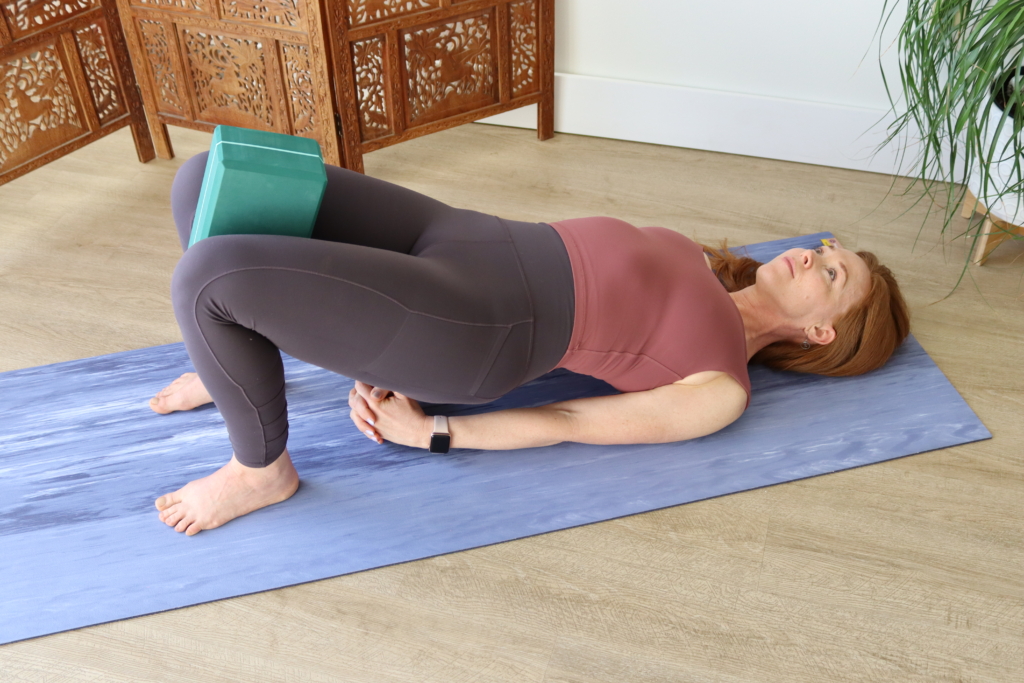
Do you knees splay out to the sides in Bridge Pose (Setu Bandha Sarvangasana)? This is something I’ve observed a lot, both in myself in the earlier years of practice, and in many yoga students. Is it a problem? Over time, I’m guessing it could be, in particular, for your knees and sacroiliac (SI) joint. There are several ways to remedy it. The one I’ll discuss today involves placing a Yoga Block between your knees in Bridge Pose to strengthen your adductors.
What Are the Adductors?
The adductors are the muscles of the inner thighs. They include:
- Pectineus
- Adductor longus
- Adductor brevis
- Gracilis
- Adductor magnus (the largest muscle in the group)
The adductors draw the leg toward the center line (adduction) and internally rotate the thigh at the hip joint. This muscle group stabilizes the pelvis, helping to balance the pelvic position during walking. They also support “explosive” movements, such as jumping and running. Whether we know it or not, the adductors support nearly all our daily activities.
When we spend a lot of time sitting, both the adductors and abductors (outer thigh and hip muscles that move the leg away from the center line) can weaken. Over time, this can destabilize the knees, leading to knee pain and dysfunction. In my own informal “study” of adductor strength and weakness, I’ve found that strengthening the abductors has helped keep my SI joint more stable.
How Can You Strengthen Your Adductors in Yoga Practice?
How can you tell if your adductors are weak? Try this simple inquiry: with your feet a little wider than hips-width apart and parallel, bend your knees about 90 degrees into a standing squat. Do your knees want to splay out to the sides? If so, your adductors are not pulling their weight. However, even if your thighs easily stay parallel, it’s still a good idea to strengthen your adductors, especially if you sit a lot during the day.
In yoga, there are lots of poses that stretch the adductors—think Trikonasana (Triangle Pose), Upavista Konasana (Wide-Legged Seated Forward Bend), Baddha Konasana (Bound Angle Pose)—but not a lot of poses that strengthen your adductors. Squeezing a Yoga Block between your thighs in Bridge Pose is one way to protect your knees and SI joint while you’re in the pose. Practicing with a block will also strengthen the adductors, which will help stabilize your knees and SI joints in the long run.
Pressing your thighs into a Yoga Block in Bridge Pose also helps protect your hip joints. When we practice Bridge, it’s common to push up with the glutes in order to get as much height as possible. This can cause us to push into hip joints, which can cause the femur heads to push against the edges of the hip sockets. When we do this repeatedly over time, the joint’s cartilage and labrum can wear down. In the instructions below, I’ll suggest a different way of moving into Bridge Pose to help you avoid doing this. The Yoga Block between the thighs will give additional support to hip joints as well.
How to Strengthen Your Adductors with a Yoga Block
- Lie on your back on a Yoga Mat. Have a 4-inch Yoga Block close by.
- Bend your knees and place the soles of your feet on the floor. Draw your knees in toward your chest and place the Yoga Block between your thighs, just above your knees. Place your feet back onto the floor.
- Draw your arms in close to your sides. Bend your elbows so that your forearms are vertical. Press your elbows into the floor and simultaneously arch your back away from the floor. Then extend your arms alongside your body.
- Now press your feet into the floor while pressing your thighs into the Yoga Block.
- Extend your knees outward, away from your pelvis, to initiate the lift into Bridge Pose. Then continue that action as you lift your back all the way into the pose. Throughout the duration of the pose, maintain this extension of the thighs. This will help prevent you from pushing into your hip joints. It also helps keep your legs parallel rather than splaying out to the sides.
- Keep pressing your legs into the Yoga Block and extend your knees out away from your pelvis.
- Hold for 5 to 10 deep breaths.
- Extend your arms out along the floor, overhead. Stretch out through your arms and lengthen your spine as you slowly lower your back down onto the floor.
- Repeat two or more times if you like.
